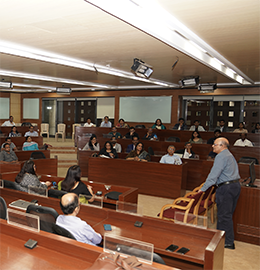Centre for Capital Markets and Risk Management co-hosts accountancy conference

‘Collaborative Horizons: Industry Meets Academia’ in partnership with ACCA held on 25 September
27 September, 2024, Bengaluru: The Centre for Capital Markets and Risk Management—a Centre of Excellence at IIM Bangalore, recently hosted an academic accounting conference on ‘Collaborative Horizons: Industry Meets Academia’, in partnership with the Association of Chartered Certified Accountants (ACCA), on 25 September 2024 at IIM Bangalore. The conference brought forward stimulating discussions around the theme of Technology, Innovation and the Future of Accounting.
Key presentations:
Narayanan Vaidyanathan, Head of Policy Development, ACCA traced the arrival of AI within modern finance. With AI promising a range of opportunities in financial forecasting, Mr. Vaidyanathan discussed how organizations have leveraged emerging tech to optimize processes and decision-making. The rising IT investments in India, he added, only reaffirm the immense potential of AI—not just in boosting efficiency, but also in fueling innovation across the finance function.
Prof. Srinivasan Rangan, Finance & Accounting area, provided a comprehensive overview of AI's impact on IT investments, both in India and globally. While AI adoption comes with significant costs, the opportunities it creates, particularly in auditing and finance, are invaluable, Prof. Rangan stated. He outlined ways in which AI has revolutionized auditing processes by identifying red flags—from detecting red flags and refining stock valuations to boosting audit sampling accuracy. However, he cautioned the audience that despite its many advantages, AI has limitations and should be used thoughtfully within the accounting profession.
Panel Discussion Highlights:
Emma Jindal, India CFO, Accenture, spoke about Accenture’s $3 billion investment in AI, with 40,000 AI specialists set to double in the next year. She noted that tools such as Excel are becoming obsolete, calling on professionals to upskill and embrace cloud computing and big data analytics. Accenture’s controllership and pre-close tool was also highlighted, impressing attendees with its simplicity and efficiency.
Navin Gadia, Vice President and Global Controller, Wipro Limited, advocated for the robust governance of AI, including stringent policies around data privacy. He cautioned against the reckless use of AI, thereby recommending the establishment of a governance committee to oversee AI usage.
Prof. M. Jayadev, Finance & Accounting area, reminded everyone that while AI will likely determine the wider world banks operate in, there is no substitute for a solid understanding of accounting principles. Academic institutions play a significant role in bridging the gap between students and the finance industry, Prof. Jayadev emphasized.
Naina V G, Strategic Head of Corporate Alliances, ACCA, discussed the significance of digital literacy and noted that tools such as Python and Power BI are quickly replacing outdated technologies, making it essential for finance professionals to stay updated.
Centre for Capital Markets and Risk Management co-hosts accountancy conference
‘Collaborative Horizons: Industry Meets Academia’ in partnership with ACCA held on 25 September
27 September, 2024, Bengaluru: The Centre for Capital Markets and Risk Management—a Centre of Excellence at IIM Bangalore, recently hosted an academic accounting conference on ‘Collaborative Horizons: Industry Meets Academia’, in partnership with the Association of Chartered Certified Accountants (ACCA), on 25 September 2024 at IIM Bangalore. The conference brought forward stimulating discussions around the theme of Technology, Innovation and the Future of Accounting.
Key presentations:
Narayanan Vaidyanathan, Head of Policy Development, ACCA traced the arrival of AI within modern finance. With AI promising a range of opportunities in financial forecasting, Mr. Vaidyanathan discussed how organizations have leveraged emerging tech to optimize processes and decision-making. The rising IT investments in India, he added, only reaffirm the immense potential of AI—not just in boosting efficiency, but also in fueling innovation across the finance function.
Prof. Srinivasan Rangan, Finance & Accounting area, provided a comprehensive overview of AI's impact on IT investments, both in India and globally. While AI adoption comes with significant costs, the opportunities it creates, particularly in auditing and finance, are invaluable, Prof. Rangan stated. He outlined ways in which AI has revolutionized auditing processes by identifying red flags—from detecting red flags and refining stock valuations to boosting audit sampling accuracy. However, he cautioned the audience that despite its many advantages, AI has limitations and should be used thoughtfully within the accounting profession.
Panel Discussion Highlights:
Emma Jindal, India CFO, Accenture, spoke about Accenture’s $3 billion investment in AI, with 40,000 AI specialists set to double in the next year. She noted that tools such as Excel are becoming obsolete, calling on professionals to upskill and embrace cloud computing and big data analytics. Accenture’s controllership and pre-close tool was also highlighted, impressing attendees with its simplicity and efficiency.
Navin Gadia, Vice President and Global Controller, Wipro Limited, advocated for the robust governance of AI, including stringent policies around data privacy. He cautioned against the reckless use of AI, thereby recommending the establishment of a governance committee to oversee AI usage.
Prof. M. Jayadev, Finance & Accounting area, reminded everyone that while AI will likely determine the wider world banks operate in, there is no substitute for a solid understanding of accounting principles. Academic institutions play a significant role in bridging the gap between students and the finance industry, Prof. Jayadev emphasized.
Naina V G, Strategic Head of Corporate Alliances, ACCA, discussed the significance of digital literacy and noted that tools such as Python and Power BI are quickly replacing outdated technologies, making it essential for finance professionals to stay updated.
